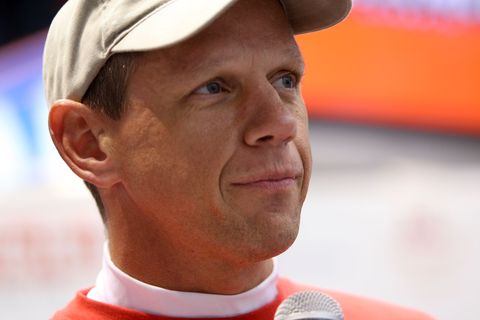
When thunder and lightning rocked the skies the morning of July 23, friends and locals texted 55-year-old Charlie Engle to see if the 26-hour run around Dorothea Dix Park in Raleigh, North Carolina, was still on for that day.
“They said, ‘Are we still doing this?’” Engle said. “But I told people early on, ‘This is the date. This is the day I got sober 26 years ago, and I’m running if a freak snow storm hits… Addiction doesn’t take a day off.”
About 10 minutes before Engle and others started running, the rain stopped.
Engle decided on the 26-hour run to celebrate what he calls his “sober birthday,” the day he was truly born after ending a battle with addiction. Every year on July 23, he tries to accomplish a difficult, physical milestone.
Running sober today, heading into tomorrow to mark my 26th year living drug and alcohol free. I’m surrounded by friends and community to run 26 hours, celebrating each year of my sobriety. We’re at a nonprofit treatment center and shelter called Healing Transitions in Raleigh, NC. If you’d like to come run some laps with us, I’ll be here all day, night, and finishing tomorrow morning at 10 am. Recovery is possible. Clean living is full of rewards. #runningsober #englerunningman #recoveryisworthit #lovetorun #recoveryispossible #runningcommunity #trailrunner #soberlife #ultrarunner #ultrarunning #ultramarathon #aroo #runhappy #runrunrun #runchat #runningmotivation #spartantraining #maratona #correr #corredores #soberliving #nomeatathlete #plantpowered #veganathlete #sobriety #cleanliving #runningismytherapy #runninglife #runforyourlife #sundayrunday
A post shared by Charlie Engle (@charlieengle) on
This year, he planned to run 26 hours for his 26th year being sober. He wanted to run on a route that might encourage locals to jump in rather than be scared off. His choice? A three-mile loop around the Healing Transitions recovery center. He ended up running 118 miles.
“[A three mile-loop] sounds terrible, but the point is I didn’t want people to be intimidated,” Engle said. “In my mind, most anybody can run three miles. I wanted it to be a distance that anybody could see this thing.”
And the community did see it. Thanks to previous postings Engle made online and a news TV spot early that morning, Engle says more than 300 people showed up that day. While some ran alongside him, many who were not physically prepared to run volunteered to help with the aid station. Engle says people came who were fighting a variety of issues: addiction, homelessness, PTSD, eating disorders, and more.
“The running community in general is probably the most well-educated community on addiction and recovery,” Engle said. “Lots of people use running or some sort of physical exercise to help them with their recovery.”
Still running! 2 hours out of 26 hours of my sobriety run remaining. I’m feeling strong and grateful for the 100s of people who have joined me to run here at Healing Transitions. Sober living is awesome living! #runningsober #englerunningman #recoveryisworthit #loverunning #recoveryispossible #runningcommunity #trailrunner #soberlife #ultrarunner #ultrarunning #ultramarathon #aroo #runhappy #runrunrun #runchat #runstreak #spartanup #marathontraining #courir #instarunners #soberliving #nomeatathlete #plantpowered #veganathlete #sobriety #runersofinstagram #runningismytherapy #runninglife #wedorecover #nomeatathlete
A post shared by Charlie Engle (@charlieengle) on
In addition to his “birthday” runs, Engle has competed in numerous challenging races: finishing Badwater six times, competed in the Ironman World Championship in Hawaii, and ran roughly marathon distance for 24 days in the Icebreaker Relay in 2016, just to name a few. Oh, and he and two friends ran across the Sahara Desert back in 2008.
For Engle, doing extreme races has never just been about physical fitness, but about mental and emotional preparation for something greater.
“We spend 99 percent of our time in life preparing for the 1 percent when things falls apart,” Engle said. “Those are the times that define you. Those are the times that actually end up teaching you who you are.”
Addiction is about feeling nothing and being invisible. Running is all about you feeling everything.
Engle explained that for an addict, relapses often occur after “one really bad moment.” A job loss, a fight, or any number of things could trigger a major setback. Testing and pushing oneself towards endurance is key, and according to Engle, “You have to be ready.”
And, for the past several years, he’s already been preparing for the ultimate expedition: a run from the lowest place on the planet, the Dead Sea in Jordan, to the highest point of Mount Everest. He aims to have his feet at the starting line next February.
Engle sees the trek as a metaphor for his life: pulling himself out of the lowest kind of place, and climbing towards victory, and embracing all the trials and triumphs that come with it.
“Addiction is about feeling nothing and being invisible…running is all about you feeling everything,” Engle said. “You’re fully present when you run, for better or for worse, you get the good feelings and the bad. There’s nothing more powerful than being fully present and experiencing what you’re actually going through with an open mind and open heart and reaping the rewards of that.”
From: Runner's World US
Source: Read Full Article